Wisdom of Bear Wood
- 格式:doc
- 大小:108.50 KB
- 文档页数:14
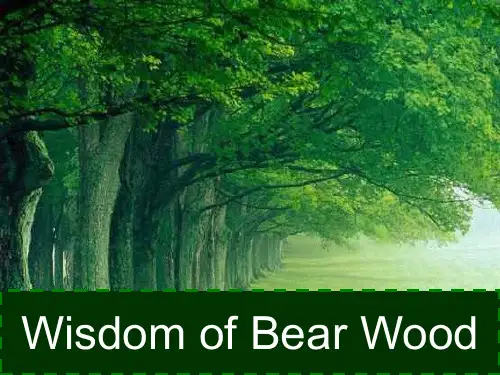
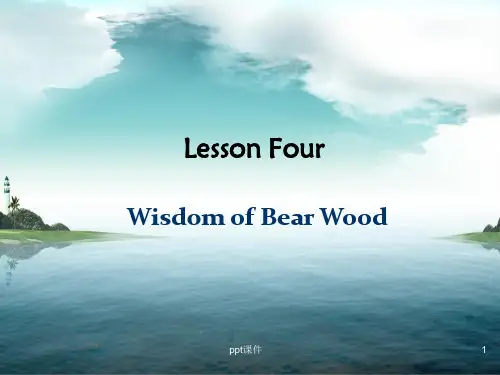
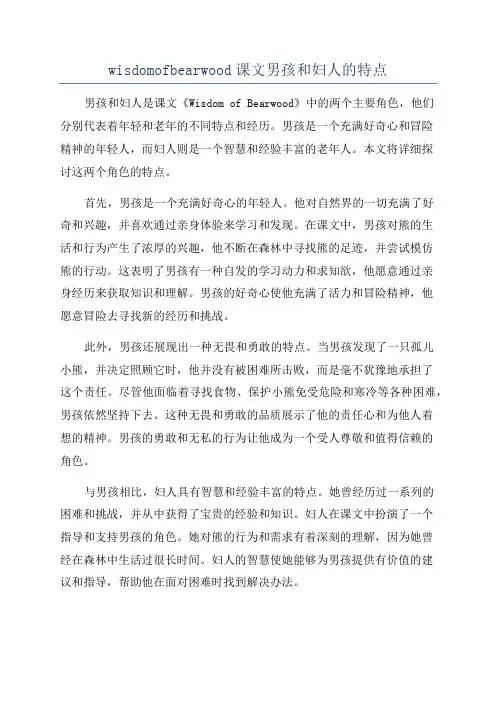
wisdomofbearwood课文男孩和妇人的特点男孩和妇人是课文《Wisdom of Bearwood》中的两个主要角色,他们分别代表着年轻和老年的不同特点和经历。
男孩是一个充满好奇心和冒险精神的年轻人,而妇人则是一个智慧和经验丰富的老年人。
本文将详细探讨这两个角色的特点。
首先,男孩是一个充满好奇心的年轻人。
他对自然界的一切充满了好奇和兴趣,并喜欢通过亲身体验来学习和发现。
在课文中,男孩对熊的生活和行为产生了浓厚的兴趣,他不断在森林中寻找熊的足迹,并尝试模仿熊的行动。
这表明了男孩有一种自发的学习动力和求知欲,他愿意通过亲身经历来获取知识和理解。
男孩的好奇心使他充满了活力和冒险精神,他愿意冒险去寻找新的经历和挑战。
此外,男孩还展现出一种无畏和勇敢的特点。
当男孩发现了一只孤儿小熊,并决定照顾它时,他并没有被困难所击败,而是毫不犹豫地承担了这个责任。
尽管他面临着寻找食物、保护小熊免受危险和寒冷等各种困难,男孩依然坚持下去。
这种无畏和勇敢的品质展示了他的责任心和为他人着想的精神。
男孩的勇敢和无私的行为让他成为一个受人尊敬和值得信赖的角色。
与男孩相比,妇人具有智慧和经验丰富的特点。
她曾经历过一系列的困难和挑战,并从中获得了宝贵的经验和知识。
妇人在课文中扮演了一个指导和支持男孩的角色。
她对熊的行为和需求有着深刻的理解,因为她曾经在森林中生活过很长时间。
妇人的智慧使她能够为男孩提供有价值的建议和指导,帮助他在面对困难时找到解决办法。
此外,妇人还展示了一种关爱和耐心的特点。
尽管男孩犯了一些错误并遭受了一些失败,妇人从不责备他,而是给他鼓励和支持。
她了解到男孩需要耐心和鼓励来克服困难,并为他提供了温暖的慈爱。
妇人对男孩的支持使他能够在困难时保持乐观和坚韧,这对男孩来说非常重要。
综上所述,男孩和妇人是课文《Wisdom of Bearwood》中的两个主要角色。
男孩具有好奇心和勇敢的特点,他愿意冒险并通过亲身经历来学习。
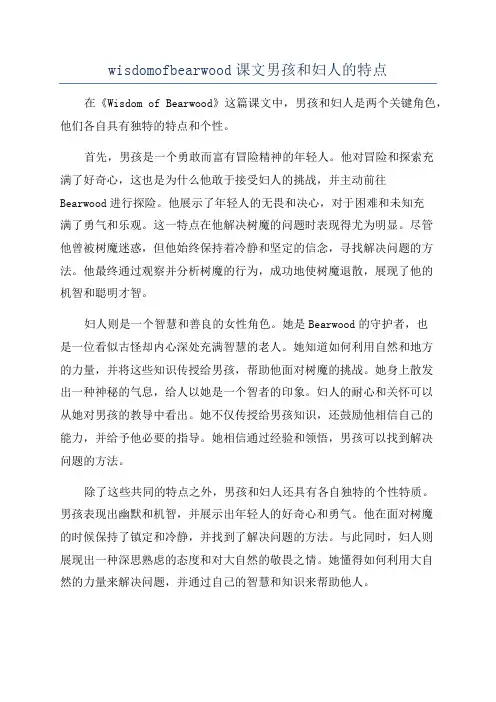
wisdomofbearwood课文男孩和妇人的特点在《Wisdom of Bearwood》这篇课文中,男孩和妇人是两个关键角色,他们各自具有独特的特点和个性。
首先,男孩是一个勇敢而富有冒险精神的年轻人。
他对冒险和探索充满了好奇心,这也是为什么他敢于接受妇人的挑战,并主动前往Bearwood进行探险。
他展示了年轻人的无畏和决心,对于困难和未知充满了勇气和乐观。
这一特点在他解决树魔的问题时表现得尤为明显。
尽管他曾被树魔迷惑,但他始终保持着冷静和坚定的信念,寻找解决问题的方法。
他最终通过观察并分析树魔的行为,成功地使树魔退散,展现了他的机智和聪明才智。
妇人则是一个智慧和善良的女性角色。
她是Bearwood的守护者,也是一位看似古怪却内心深处充满智慧的老人。
她知道如何利用自然和地方的力量,并将这些知识传授给男孩,帮助他面对树魔的挑战。
她身上散发出一种神秘的气息,给人以她是一个智者的印象。
妇人的耐心和关怀可以从她对男孩的教导中看出。
她不仅传授给男孩知识,还鼓励他相信自己的能力,并给予他必要的指导。
她相信通过经验和领悟,男孩可以找到解决问题的方法。
除了这些共同的特点之外,男孩和妇人还具有各自独特的个性特质。
男孩表现出幽默和机智,并展示出年轻人的好奇心和勇气。
他在面对树魔的时候保持了镇定和冷静,并找到了解决问题的方法。
与此同时,妇人则展现出一种深思熟虑的态度和对大自然的敬畏之情。
她懂得如何利用大自然的力量来解决问题,并通过自己的智慧和知识来帮助他人。
总的来说,男孩和妇人是《Wisdom of Bearwood》这篇课文中两个非常重要和有趣的角色。
男孩的勇气和冒险精神以及妇人的智慧和善良共同构成了这个故事的核心。
通过他们之间的互动,我们可以感受到年轻人的勇敢和愿意接受挑战,以及智者的智慧和善良。
他们各自的特点和个性使得这个故事更加生动和有趣,并且传达了一些重要的价值观,例如勇敢、冒险和善良。

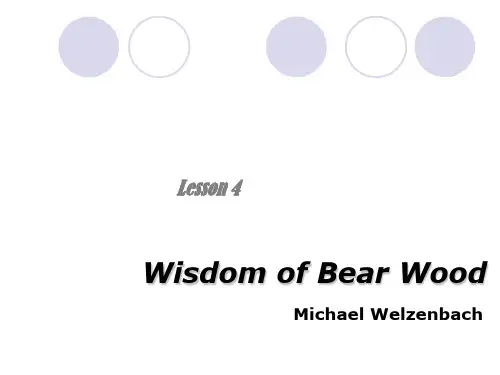
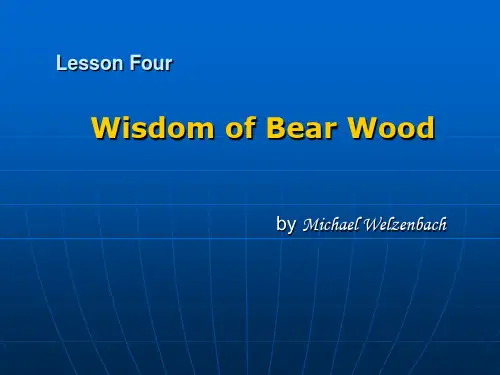
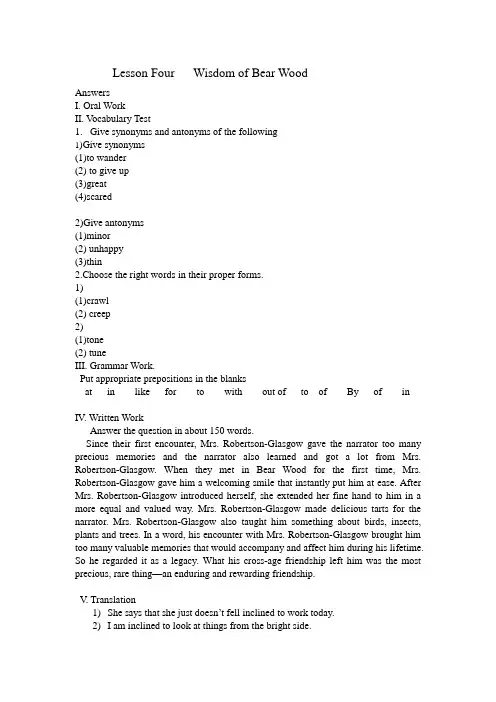
Lesson Four Wisdom of Bear WoodAnswersI. Oral WorkII. V ocabulary Test1.Give synonyms and antonyms of the following1)Give synonyms(1)to wander(2) to give up(3)great(4)scared2)Give antonyms(1)minor(2) unhappy(3)thin2.Choose the right words in their proper forms.1)(1)crawl(2) creep2)(1)tone(2) tuneIII. Grammar Work.Put appropriate prepositions in the blanksat in like for to with out of to of By of in IV. Written WorkAnswer the question in about 150 words.Since their first encounter, Mrs. Robertson-Glasgow gave the narrator too many precious memories and the narrator also learned and got a lot from Mrs. Robertson-Glasgow. When they met in Bear Wood for the first time, Mrs. Robertson-Glasgow gave him a welcoming smile that instantly put him at ease. After Mrs. Robertson-Glasgow introduced herself, she extended her fine hand to him in a more equal and valued way. Mrs. Robertson-Glasgow made delicious tarts for the narrator. Mrs. Robertson-Glasgow also taught him something about birds, insects, plants and trees. In a word, his encounter with Mrs. Robertson-Glasgow brought him too many valuable memories that would accompany and affect him during his lifetime. So he regarded it as a legacy. What his cross-age friendship left him was the most precious, rare thing—an enduring and rewarding friendship.V. Translation1)She says that she just doesn’t fell inclined to work today.2)I am inclined to look at things from the bright side.。
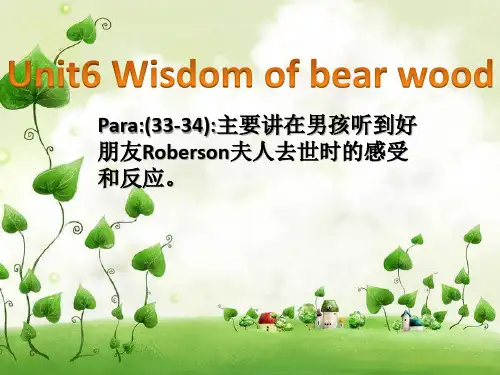
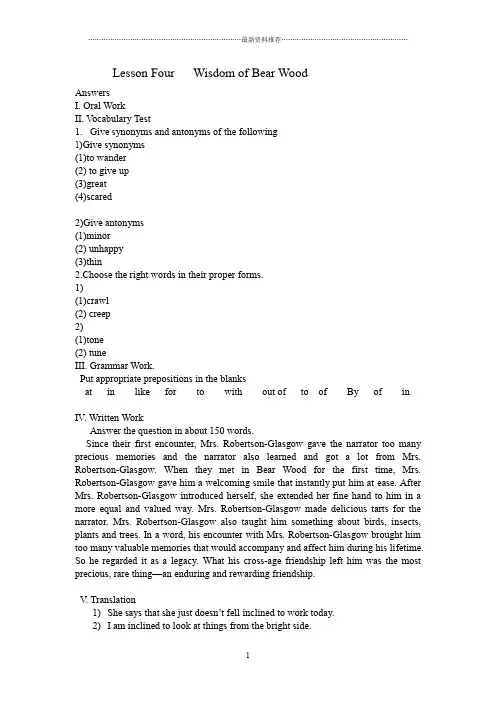
Lesson Four Wisdom of Bear WoodAnswersI. Oral WorkII. V ocabulary Test1.Give synonyms and antonyms of the following1)Give synonyms(1)to wander(2) to give up(3)great(4)scared2)Give antonyms(1)minor(2) unhappy(3)thin2.Choose the right words in their proper forms.1)(1)crawl(2) creep2)(1)tone(2) tuneIII. Grammar Work.Put appropriate prepositions in the blanksat in like for to with out of to of By of in IV. Written WorkAnswer the question in about 150 words.Since their first encounter, Mrs. Robertson-Glasgow gave the narrator too many precious memories and the narrator also learned and got a lot from Mrs. Robertson-Glasgow. When they met in Bear Wood for the first time, Mrs. Robertson-Glasgow gave him a welcoming smile that instantly put him at ease. After Mrs. Robertson-Glasgow introduced herself, she extended her fine hand to him in a more equal and valued way. Mrs. Robertson-Glasgow made delicious tarts for the narrator. Mrs. Robertson-Glasgow also taught him something about birds, insects, plants and trees. In a word, his encounter with Mrs. Robertson-Glasgow brought him too many valuable memories that would accompany and affect him during his lifetime. So he regarded it as a legacy. What his cross-age friendship left him was the most precious, rare thing—an enduring and rewarding friendship.V. Translation1)She says that she just doesn’t fell inclined to work today.2)I am inclined to look at things from the bright side.。
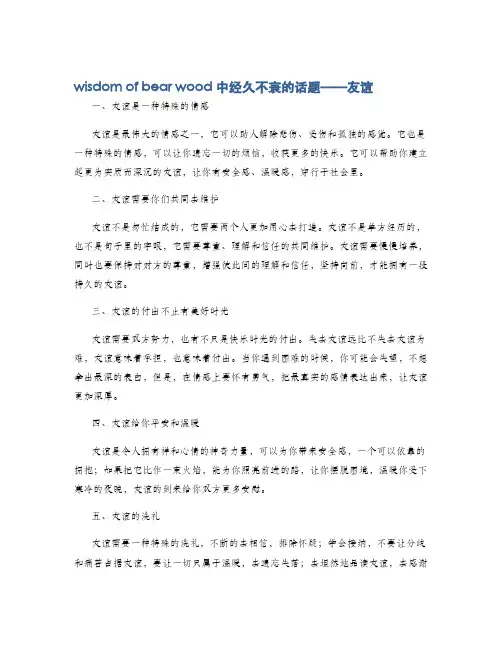
wisdom of bear wood中经久不衰的话题——友谊
一、友谊是一种特殊的情感
友谊是最伟大的情感之一,它可以助人解除悲伤、受伤和孤独的感觉。
它也是一种特殊的情感,可以让你遗忘一切的烦恼,收获更多的快乐。
它可以帮助你建立起更为实质而深沉的友谊,让你有安全感、温暖感,穿行于社会里。
二、友谊需要你们共同去维护
友谊不是匆忙结成的,它需要两个人更加用心去打造。
友谊不是单方经历的,也不是句子里的字眼,它需要尊重、理解和信任的共同维护。
友谊需要慢慢培养,同时也要保持对对方的尊重,增强彼此间的理解和信任,坚持向前,才能拥有一段持久的友谊。
三、友谊的付出不止有美好时光
友谊需要双方努力,也有不只是快乐时光的付出。
失去友谊远比不失去友谊为难,友谊意味着承担,也意味着付出。
当你遇到困难的时候,你可能会失望,不想拿出最深的表白,但是,在情感上要怀有勇气,把最真实的感情表达出来,让友谊更加深厚。
四、友谊给你平安和温暖
友谊是令人拥有祥和心情的神奇力量,可以为你带来安全感,一个可以依靠的拥抱;如果把它比作一束火焰,能为你照亮前进的路,让你摆脱困境,温暖你受下寒冷的夜晚,友谊的到来给你双方更多安慰。
五、友谊的洗礼
友谊需要一种特殊的洗礼,不断的去相信,排除怀疑;学会接纳,不要让分歧和痛苦占据友谊,要让一切只属于温暖,去遗忘失落;去坦然地品读友谊,去感谢
这份真情,去祝福它历经大风日雨也不改变;去探究友谊的温婉,乘着它的力量去开启新的明天!。
Wisdom of Bear Wood熊林的智慧_Klien12岁时,我随爸妈搬到了英国,这已经是我长这么大以来第四次大的搬迁。
爸爸的公务员身份让他必须得每隔几年就搬一次家。
我也必须得跟以前的朋友说再见。
我们在Berkshire租了一间18世纪的老房子,身处于优美的自然环境中,周围是古老的城堡,教堂。
我很喜欢无边无际的大片的农田和房子周围的林地。
我们的后篱笆紧挨着森林,密密麻麻的丛林小道纵横交错,路人经过时还会惊起停息在月桂树上的小鸟。
大多数时间里,我总是一个人漫步在森林和田地里,幻想着自己是侠盗罗宾,收集各种虫子欣赏身旁的鸟儿。
这对我来说是一个孤独的天堂。
尽管频繁的搬家让我尽量不再留恋周围的环境。
但我却不由自主的爱上了这里。
在我们搬到英国六个月之后,老农克劳福德终于允许我在这片神圣之地漫步了,于是,我开始了每周一次的远足。
穿过陡峭的山坡就是一片紧密的熊树林,这是我的秘密堡垒,是一个对我来说近乎神圣的地方。
越过篱笆,远离明媚的阳光,叽叽喳喳的鸟鸣,以及嘻嘻嗦嗦的动物和蚊虫声。
便进入到了我的圆顶大教堂,粗壮的树干作为教堂的立柱,厚厚的针叶作为教堂的地毯。
这是一个静得能听见自己呼吸声的地方,任何动物发出哪怕一点声响,都会回荡在教堂里,久久不息。
一个春日的下午,我寻找着上周看见的一个池塘,轻轻地,不想惊动鸟儿去通报我的到来。
也许正是因为我的小心翼翼才会在遇见那位瘦弱的老妇人时感到惊讶。
她屏住呼吸,本能的捂着自己的喉咙。
但很快,她便反应过来,微笑着迎接我的来访。
这也让我缓过神来,看清她脖子上挂着的一副双筒望远镜。
“你好,年轻人”她说“你是美国人还是加拿大人?”美国人,我迅速回答到,我住在山顶另一边,我到这来只想知道这是否有个池塘,而且我还得到了老农克劳福德的批准,反正,我现在要回家了,再见。
当我转身准备离开时,老妇人笑着问道:“你今天看到那只住在林子里的小猫头鹰了吗?”她指向林子的一角。
她知道猫头鹰的事?我很惊讶。
Wisdom of Bear WoodI. Pre-class Work1. Read the text and listen to the recording. Try to understand as much as possible with the help of the notes, glossary, dictionaries and reference books. Think over the following questions:✓Introduce one of your best friends to your classmates. Are there things in common that lead to your friendship?✓Why do we need friendship? What can we get from it?✓Can you give us some tips to better cultivate friendship?✓List out the ingredients you think of importance to true friendship.2. Make up a story with the following elements:Woodland, cottage, an owl, an old lady, a little boyCompare your story with the text. Have you found anything unexpected?II. Introduction to the TextIt’s a story about both the beautiful nature and beautiful friendship. It is about “ a wisdom tutored by nature itself, about the seen and unseen, about things that change and things that are changeless, and about the fact that no matter how seemingly different twos souls may be, they possess the potential for that most precious, rare thing---an enduring and rewarding friendship.Why the “seemingly different two soul” become good friends?First, they are both lonely: the boy is lonely because he is in a foreign country with his father; the woman is lonely because she has just lost her dear husband.Second, they have the common interest in nature and knowledge, which is another bond of their friendship. The shortbread the woman keeps supplying for the boy is also one of the reasons.But the real reason for their friendship is the old woman’s selfless interest in the boy. It is often said that true love is in the giving and not in the taking. So is friendship. The woman not only gives the boy good food to eat, she also gives him a new vision of the beautiful nature, the key to the treasury of human knowledge, and above all, her care, concern, love and affection. Does she get anything in return? Yes. Through giving, she cannot help receiving. Although totally unaware, the boy has given the woman great consolation too. He is the real good companion of the woman. He brings great happiness and consolation to the woman. That is what she really needs in her deep heart.III. Basic Structure of the TextPart I (Para.1-4): The loneliness of the boy and his roaming in the woods.Part II (Para. 5-23): The boy met Mrs. Robertson-Glasgow in the Bear Wood and they became best friends.Part III (Para.24-27): Mrs. Robertson-Glasgow became sick and dead while their friendship flourished more than ever before.Part III (Para.28-37): The death of the old lady and the boy’s nostalgia for her.IV. Text in DetailPara 11. the title: wisdom of bear wood: the name of a wood, where, presumably, there areor there used to be bears-a large strong animal. So this is an entirely different word from bear in the sense of 忍受. These two words are called homonyms, which means words that happen to have the same sound and often the same spelling but different inmeaning. In dictionaries, they are put in different entries. More examples: lie/ mine/ lead/ fine/ found/ ball/ bit1.…my family moved to England, the fourth major move in my short life…: Thisnoun phrase could be regarded as an condensed non-restrictive relative clause: which was the fourth…, which is referring to what is stated in the main clause.More examples: Lottie grinned, a real wide open grin./ His father was laughing, a queer sobbing sort of laugh.2.demand that…: subjunctive mood3.overseas:4.every few years5.be used to doing6.wrench myself away from:她努力把身体挣脱开来。
When Michael was 12years old, he moved to England because of his father’s job. He lived in a farmhouse in Berkshire which has beautiful scenery. When he came there for about six months, the old farmer Crawford allowed him to roam Bear Wood. As it was a good place toclose to nature,he very enjoyed this private paradise.One spring afternoon he wandered to find a pond in the Bear Wood. In ordernot to alarm the bird, he was startled. At that time, he met an old lady, Mrs. Robertson-Glasgow. The old lady was so kind that made he feel at ease. According to the talk of owls, he knew that she is also a person who enjoy nature. When he was invited to her home to discuss the owls, he agreed. Mrs. Robertson-Glasgow’s cottage was full of figures of ivory, carved stone, fossils and so on, which made himsurprised.At the cottage, she told he a lot of the knowledge of nature and treated he with tea and jam tart. In addition, she lent him two large tomes about nature when he came home. Also, Michael promised to return them the next week. Because of the books, he almost every weekend went to her cottage and she would tell him the natural history. Soon they became good friends. They spent summer blissfully together to read, to explore Bear Wood, to talk. However, one morning he was told by his mother that his friend, Mrs. Robertson-Glasgow passed away and she left the biscuit tin for him. He was so upset that he wandered in the Bear Wood for a long time to dry his tears. Though Mrs. Robertson-Glasgow passed away, the most precious, rare thing——an enduring and rewarding friendship was always there.。
Unit 4 Wisdom of Bear WoodI Pre-class work1. Paraphrase.1) I spent most of my time wandering in the forests and the fields alone, acting Robin Hood, daydreaming collecting bugs and bird-watching. (Para. 3)2) To live a quiet life and not to get involved with other people was my way of avoiding any friendship that I would only have to abandon the next time we moved. (Para. 3)3) But one day I began a friendship just by chance. (Para. 3)4) I started to take a long walk.., to a dense growth of trees called Bear Wood. (Para. 4)5) Yes, they are watchful; But the bad thing is that some gamekeepers have been killing them since they got here and they were brought into this place form somewhere else, not born and raised here.6) I looked at the cabinets with glass windows that contained statues and models carved out of ivory and stone trays of butterflies fastened with pins and.., about twelve birds that were made into specimens. (Para. 18)7) I learn a lot of knowledge, taught by nature itself, about the things I can see--the birds, insects, trees, and flowers, and the things I cannot see--ideas, scientific laws and principles. I also learn a lot about the things that change, including life itself, as well as the things that are changeless like friendship, love, and many basic values. (Para. 37)2. Learn to use the dictionary and other reference books.1) Give the definition of the following.(1) odds and ends: small things of various kinds without much value(2) rather than: instead of2) Find the synonyms and the antonyms of the following in a Thesaurus.(1) immense antonyms: little, small, tiny, minute(2) to glow synonyms: to radiate, to blare, to blaze, to brighten, to gleam, to shine3. W0rd-building.l) Give corresponding nouns of the following verbs.(1) possession (2) endurance (3) penetration(4) encounter (5) retirement (6) suspicion/suspect(7) abandonment (8) inclination (9) exploration(10) recovery (11) warning (12 ) proceeding(13) fascination (14) form/formation (15) glimpse2) Give corresponding nouns of the following adjectives.(1) anxiety (2) misery (3) density(4) instinct (5) familiarity (6) essence(7) immensity (8) stupidity (9) suddenness(10) invisibility (11) generosity (12) productivity(13) fondness (14) equivalency3) Guess the meaning of the following, based on the rules of word-building you have learned.(1)一个吸引人的故事(2)一番引言,开场白(3)令人惊异的快速康复(4)一份费力的工作(5)集体的努力(6)一个可爱的人(7)一番深刻的分析(8)渴望权力的人们(9)使铁路行业私有化(10)一位非常娇惯子女的母亲(II)一次毫无意义的行动(12)秘密的行为(13)被认为是不可触知的(14)他那好笑的笨拙的样子(15)外汇收入(16)看上去可疑的(17)能见度低(18)听起来迂腐的(19)有很多崇拜者(20)积累的资金(21)易变的天气(22)无色的液体(23)冗长的讲话4) Study carefully and discover new rules of word-building.(1) the adjectives used as verbs(2) the suffix "-ify" added to the end of a word to change it to a verb, meaning to make something be in the stated state or condition(3) the compound nouns consisting of two words with the first one as the object of the action denoted by the second one More Work on the TextII Vocabulary1. Translate1) into English.(1) to explore the secrets of nature (2) to endure pain and suffering(3) to earn everyone's admiration (4) to suspect a dirty plot(5) to introduce this sheep (6) to surround the enemy(7) to demand an open apology (8) to extend her hand(9) to roam the fields (10) to dangle his feet(11) to catch one's breath (12) to give permission(13) to abandon hope (14) to accumulate experience(15) to form a strong team (16) to possess property(17) to design a new model (18) to collect facts2) into Chinese.(1)一次有收获的经历(2)看起来似乎不同(3)零星的东西(4)古老的城堡(5)铁丝网篱笆(6)石雕的人或动物像(7)人间天堂(8)制成标本的鸟(9)密集的月桂树丛(10)铺着柔软地毯的地板(11)一种珍稀动物(12)潜在的购买者(13)晒干了的树叶(14)样子很熟悉的房子(15)笨拙的动作(16)退休工人(17)面上有玻璃的书架(18)高倍望远镜2. Give synonyms and antonyms of the following.1) Give synonyms.(1) to wander (2) to give up(3) great, large, massive, huge (4) heavenly, sacred(5) heaven (6) to look at(7) to continue (8) dear(9) lasting (10) attractive, admirable(11) silently (12) to watch(13) weak (14) to alarm, to give a start(15) to gather (16) to teach(17) to own (18) to surprise, to astonish(19) sadly thoughtful (20) alert, watchful, cautious2) Give antonyms.(1) minor (2) unhappy, displeased (3) thin(4) hell (5) public (6) introduced(7) invisible (8) unseen (9) harmful(10) colorless (11) center (12) great3. Translate.1) There are still hundreds of millions of people in the world today who earn less than a dollar a day.2) So many people get stomach cancer. I suspect that the water we drink may be seriously polluted.3) We have earned strong support of the government to make smoking illegal in public places.4) He has earned the great admiration of the people as an honest government official.5) Old people in China today are not inclined to live with their children.6) I am inclined to look at things from the bright side.7) The smugglers seem to know all our actions. I suspect that someone among us is passing secret information to them.8) She says that she just doesn't feel inclined to work today.9) We could not identify the body because it was too badly burnt.10) These people roam from place to place without regular jobs and without social identity. More and more people now regard it as unfair.11) I still regard it as important for our young people to care about their national identity.12) With regard to flood control, I am still inclined to think that to plant more trees is more important than anything else.4. Fill in the blanks with the appropriate words.1) B 2) D 3) A 4) A 5) D 6) D 7) B/C 8) C5. Fill in the blanks with the appropriate expression below.1) wrench myself away from it 2) care to 3) keeping to herself4) Thanks to, as it were 5) odds and ends 6) went by, at ease7) with a will 8) filled up 9) at ease10) brim over 11) bursting with 12) verges on13) slipped through 14) verges against 15) warned against, as it were6. Choose the right word in the given context.1) (1) crawl (2) climbed (3) crept (4) creep/crawl2) (1) tone (2) tune (3) tune (4) tone3) (1) extend (2) expand (3) extended (4) expand4) (1) doubt (2) suspect (3) doubted (4) suspect5) (1) lonely (2) alone (3) alone, lonely (4) alone7. Translate with special attention to the different meanings of the same word or word which happen to have the same spelling.1)讨厌鬼就是那种你希望他听的时候他却偏要说的人?2)你要是三分钟之内还打不出油,就别再钻了。
Lesson Four :Wisdom of Bear WoodMichael Welzenbach1. When I was 12 years old, my family moved to England, the fourthmajor move in my short life。
My father's government job demanded that he go overseas every few years, so I was used to wrenching myself away from friends。
2. We rented an 18th—century farmhouse in Berkshire. Nearby wereancient castles and churches。
Loving nature, however, I was most delighted by the endless patchwork of farms and woodland that surrounded our house。
In the deep woods that verged against our back fence, a network of paths led almost everywhere, and pheasants rocketed off into the dense laurels ahead as you walked。
3. I spent most of my time roaming the woods and fields alone,playing Robin Hood, daydreaming, collecting bugs andbird—watching。
It was heaven for a boy —but a lonely heaven。
Wisdom of Bear WoodI. Pre-class Work1. Read the text and listen to the recording. Try to understand as much as possible with the help of the notes, glossary, dictionaries and reference books. Think over the following questions:✓Introduce one of your best friends to your classmates. Are there things in common that lead to your friendship?✓Why do we need friendship? What can we get from it?✓Can you give us some tips to better cultivate friendship?✓List out the ingredients you think of importance to true friendship.2. Make up a story with the following elements:Woodland, cottage, an owl, an old lady, a little boyCompare your story with the text. Have you found anything unexpected?II. Introduction to the TextIt’s a story about both the beautiful nature a nd beautiful friendship. It is about “ a wisdom tutored by nature itself, about the seen and unseen, about things that change and things that are changeless, and about the fact that no matter how seemingly different twos souls may be, they possess the potential for that most precious, rare thing---an enduring and rewarding friendship.Why the “seemingly different two soul” become good friends? First, they are both lonely: the boy is lonely because he is in a foreign country with his father; the woman is lonely because she has just lost her dear husband.Second, they have the common interest in nature and knowledge, which is another bond of their friendship. The shortbread the woman keeps supplying for the boy is also one of the reasons.But the real reason for their friendship is the old woman’s selfless interest in the boy. It is often said that true love is in the giving and not in the taking. So is friendship. The woman not only gives the boy good food to eat, she also gives him a new vision of the beautiful nature, the key to the treasury of human knowledge, and above all, her care, concern, love and affection. Does she get anything in return? Yes. Through giving, she cannot help receiving. Although totally unaware, the boy has given the woman great consolation too. He is the real good companion of the woman. He brings great happiness and consolation to the woman. That is what she really needs in her deep heart.III. Basic Structure of the TextPart I (Para.1-4): The loneliness of the boy and his roaming in the woods.Part II (Para. 5-23): The boy met Mrs. Robertson-Glasgow in the Bear Wood and they became best friends.Part III (Para.24-27): Mrs. Robertson-Glasgow became sick and dead while their friendship flourished more than ever before.Part III (Para.28-37): The death of the old lady and the boy’s nostalgia for her.IV. Text in DetailPara 11. the title: wisdom of bear wood: the name of a wood, where, presumably, there are or there used to be bears-a large strong animal. So this is an entirely different word from bear in the sense of 忍受. These two words are called homonyms, which means words that happen to have the same sound and often the same spelling but different in meaning. In dictionaries, they are put in different entries. More examples: lie/ mine/ lead/ fine/ found/ ball/ bit1.…my family moved to England, the fourth major move in myshort life…: This noun phrase could be regarded as an condensed non-restrictive relative clause: which was the fourth…, which is referring to what is stated in the main clause. More examples: Lottie grinned, a real wide open grin./ His father was laughing, a queer sobbing sort of laugh.2.demand that…: subjunctive mood3.overseas:4.every few years5.be used to doing6.wrench myself away from:她努力把身体挣脱开来。
/用力把手脱开。
7.Question: Why did Michael’s family go to England? How did helike the frequent moves?Para 21.nearby were ancient…: inversion2.loving nature, however,…: However, as (because) I lovednature… present participle used as an adverbial clause of cause/reason.3.delight;4.a patchwork of farms …: farms that look like small pieces ofcloth of different colors when seen from far above.A. patch/ patchwork5.surround/ surroundings6.in the deep woods that verged against our back fence…:A. deepB. verge/ verge against/ verge on/ on the verge of sth.C.againstD.Chinese version7.a network of8.lead anywhere/ lead to nowhere9.rocket off: go off like rocket; move extremely quickly: 她转瞬间成了明星。
/房价正飞涨。
Similar usages: f actories mushroomed.( They grew like mushroom.) / He was wolfing it down as if he had not eaten for days./ It could snowball into a serious conflict.( gradually develop into a serious conflict like a snowball.)/ He tried to worm into that organization.Para 31.roam: walk or travel for a long time without any clear purpose.Here it is used as a transitive word. Normally it is used as intransitive verb as in “ roam about” “roam around”e.g. roam through the deserted village/ roam over sth.2.play3.Robin Hood:Exercise1.He was a young man barely eighteen years, evidentlycountry____ (长大的)2.The new secretary has written a remarkably ____ report.( concise;precise; elaborate)3.exhausted/ exhaustive/ exhausting/ exhaustible4.She called ____ world opinion to condemn their policy ofaggression.5.The poor reception on your TV is probably due to outside ______.(intervention/ interruption/ interception/ interference)6.He couldn’t explain the problem well, as he had only a(n) ____knowledge of the subject. (elementary/ rudimentary/ fundamental/ basic)7.One small settlement is expected to ______ 10,000 families.(populate/ dwell/ reside/ house)8._____the mercy of sb. 由某人摆布,控制9.We have to ____ if we want to go to Florida this summer. (lay up/save up/ put aside/ put away)10.They always take ___ extra staff in the summer season.4.bug: (CD Unit 4 Book 3 College English)5.Keeping to myself was my way of not forming attachments thatI …:A.ParaphraseB.Keep to oneselfC.Attachment( to/for sb./sth.)D.Attached6.But one day I became attached through no design of my own.A.Chinese version.B.Paraphrase: not that I intended ( planned) to do it./ just bychanceC.Design: purpose; intentionD.Have design on sb./ sth.: intend to harm sb/sth or take sb./sth.for oneself. E.g. 觊觎他的钱财/他对她心存不良。